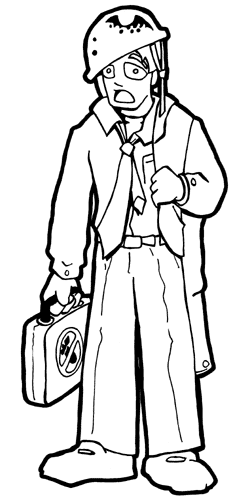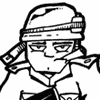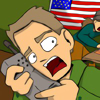The German Bunnyhopper is tearing our lines to shreds! We'll have to send in ... Sergei.

The Russian Commander, a grizzled veteran who had seen action on many fronts, was in a livid rage. He virtually spat at the men lined up in the dusty bunker below the city proper. "That Damn German Bunnyhooper is bouncing up and down Stalingrad like he owns the place, making a mockery of our machinegun nests and spider holes!" he cried. "He's bombing every target 20 seconds after the round starts. He must be stopped at any cost!" The commander stopped in mid-stride, then lowered a boot to the floor and turned to face his troops. "I see no other way..." he said quietly. "Get me Sergei Hopzalov."
Sergei Hopzalov was a young miner's son turned infantryman, with matted blonde hair and a scraggly dirty blonde beard, drafted out of the Caucasus and shipped the front having never held a rifle in his life. He earned his stripes and the attention of the Political Officers when he single-handedly bunny-hopped unopposed through the besieging army at Leningrad. Now he was a national hero, inspiring children from all over the Steppes to jump up and down as they ran.
But could this illiterate child of the mountains hope to take on the unerring bounce of the feared and notorious Karl VonBunhopfen?
The railyard was quiet but for the distant clatter of faraway firefights. A light snow drifted down from the soot-blackened sky, giving an ethereal quality to the black twisted fingers of gutted brick buildings reaching toward the clouds. The smoldering hulk of a German tank clicked and tinked near the warehouse, the innards still warm from the fire that consumed it hours before. And from behind this hulk, without warning, dashed VonBunhopfen.
His first leap was his most dramatic: a bold hop that cleared a grenade without getting pegged by even a slice of shrapnel. Arms flailing, his next hop was smooth and graceful, machinegun bullets whizzing all around his head and torso. And so he continued, hopping across the crackling snow.
"Get him, Sergei!" cried the commander, pushing his young Russian hero out of the warehouse and into the white fury. At the first crack of gunfire from the windows, Sergei almost forgot to hop — a move that would've been suicide. But then the instincts kicked in, and he hopped! And hopped! And hopped again!
Across the twisted train tracks and amid the hellish raking gunfire, the two opponents spotted one another. Von BunHopfen did a doubletake; he nearly fell mid-leap. Hopzalov, on seeing his foe, did an amazing strafe-hop, just to demonstrate that he was serious. The two opponents both drew their submachine guns and opened fire, each one frantically spraying bullets in wide random arcs as they leapt and skipped, sometimes on one foot, sometimes on two. But of course neither hit the other.
Around them the din of the guns was a dull roar, bullets whirling from small arms and heavy machineguns alike. "Cease fire!" called out the Russian Commander, peering at the bouncing foes through his binoculars. "They're jumping up and down, thus immune to our weapons!"
The German and the Russian, finding themselves in a sudden eerie quiet, both frantically reloaded their guns as they hopped and skipped. They circled around one another, jumping up and down, their arms flipping above their heads. VonBunhopfen saw through the twinkling snow the face of Hopzalov, with bright red cheeks and a twisted beard framing a broad, childlike gin. Could he possibly hold out against such a foe? His legs began quivering like noodles as he hit the ground after each hop. Would he be able to hold out against this new, younger foe?
* * *
FLASHBACK: The VonBunhopfen Estate. Bavaria, 1913.
Young Karl jumped and jumped again, flanked on either side by stone-faced manservants in dark uniforms who whirled the jumprope in time to the nearby clack of a metronome. One of them counted out in sharp-tongued German: "506! 507! 508! 509!" Little Karl, his blonde hair sticky with sweat, could barely keep his legs bent.
Suddenly, the rope caught his shoe and he fell to the flagstones, skinning his knee below his short knickers. The drone of the counting ceased, to be replaced by the chirp of birds, but the metronome clicked angrily on. His little face grew red; it twisted. Tears flowed. Little Karl began to cry.
He lifted himself on his weak little legs, and stumbled toward the grass, a trickle of blood down his knee. "Papa! Papa!" he blubbered. "I don't want to jump anymore!"
When his massive father lifted himself from the lawn chair to tower over his son, the tears suddenly halted. The elder VonBunhopfen, with his great grey beard waxed into two pointed horns on either side of his chin, loomed over his offspring. Behind him the stone walls of the manor gave silent tribute to his father's authority.
The great man withdrew a delicate gold watch from his waistcoat pocket, flicked it open, then snapped it shut again with a guttural harumph. "Done jumping?" he rumbled. His cold eyes turned to pierce his son. "Would the Kaiser be done jumping?"
Little Karl looked down sheepishly at his feet and his sagging socks. "Nein..." he answered in a tiny voice.
"Neeeeeeeeiiiiiiinnn!" rebutted his father, drawing out the word to drive his point home. "Now JUMP! Jump, boy, jump! HOP! Hop for the FATHERLAND!"
Karl stumbled back to the jumprope, wiping tears on his flopping sleeve. The trickle of blood from his knee rolled down to his ankle. The jumprope started. Karl VonBunhopfen jumped it.
* * *
Stalingrad, October 1942
Behind the soot-grey skies the sun had begun to set, casting an unnatural orange glow throughout the remnants of the falling snow. Sergei Hopzalov stared anxiously into the cold steel-blue eyes of his German counterpart. Their submachineguns had long before run out of ammo and had been cast aside. Each combatant now only had a pistol. The maneuvering had stopped, and the two opponents now faced one another on either side of a pair of icy railway tracks.
They were hoping up and down.
They were hopping up and down knowing that the first man to stop hopping would be shot and killed immediately by the victor. Sergei had tried everything; he'd strafe-hopped, he double-hopped, he even tried a stint at crouch-jumping. But the cold German matched him hop for hop, skip for skip, unmoving, unerring.
Could Sergei hope to overcome his bouncing foe? Would Russia's heartland fall to jackbooted jumpers such as VonBunhopfen? Segei could barely feel his legs, could hardly jump his next jump...
* * *
FLASHBACK: Caucasus Mountains, 1933
The snow fell thick, white and pure, yet the ground was grey in the diffused daylight. The courtyard was partially defined by what little of the wooden fence remained that had not been plundered for firewood. Three lines of ragged young men leapt up and down before the officer who barked at them through a speaking trumpet. Steam escaped their mouths and poured from their sweating faces. Young Sergei Hopzalov was at that awkward age just beyond puberty, his body misproportioned to itself and gangly from growth despite lack of nourishment.
"Jump! Jump! Jump! Jump!" cried out the man, his voice booming through the trumpet and calling faintly back to them as echoes from the mountains. In the distance thumped outdating mining equipment, rusting in the elements, and faintly the shrill whistle and chug of a train made itself heard over the wind.
Young Sergei could take it no more. His body was burning and sticky with sweat and heat, and yet the freezing air kept cutting into his lungs like icicles. His wobbling legs threatened to give out with each leap. Finally, he could take it no more; his knees collapsed. He stumbled forward. He stopped to press his shaking hands against his legs and to pant for air.
"Stop — STOP!" bellowed the officer with the trumpet. His aide came forward with a list and pointed to a name. The officer walked forward, his boots crunching in the snow. "Sergei Hopzalov," he droned, contemptuously. "Tell me, Sergei, why you saw fit to stop your leaping?"
"Can't ... breathe ..." Sergei panted, gasping for air. "Got ... to rest a little ..."
"REST!" boomed the Officer. "I wasn't calling out for resting. I was calling out for jumping. Does Mother Russia need resters? Did the glorious revolutionaries bleed for your right to rest?"
Sergei was flushed and terrified. "No," he stammered, righting himself. But the Officer continued.
"Perhaps you think that you are too good to jump? You will let others jump, but not jump yourself. This is not Communism. This is not our proud father Lenin's vision. This is fat! Lazy! Bourgeois! Look around you Sergei. THIS is the worker's paradise! And here, Everybody Jumps. In Soviet Union, Everybody Jumps."
"Sir, why aren't you jumping?" asked a young man called Vassili Fetisov, standing at the other end of the ranks. A pair of large burly men pulled Vassili into a nearby shed.
The Officer resumed his position at the front of the men. "In Soviet Union, Everybody Jumps." he repeated. "Jump! Jump! Jump! Jump!"
Sergei jumped.
* * *
Stalingrad, October 1942
The wind whistled through the abandoned boxcars. Two pairs of boots crunched in the snow, their soles worn. The Russian and the German hopped and hopped. They hopped and jumped and skipped and hopped.
The sun set.
Several hours later, it rose again.

"Jump, Sergei! Jump like the ... wind! Er ... something!"
Score: 8.56; Total Votes: 2,075 as of 2009-12-09.





